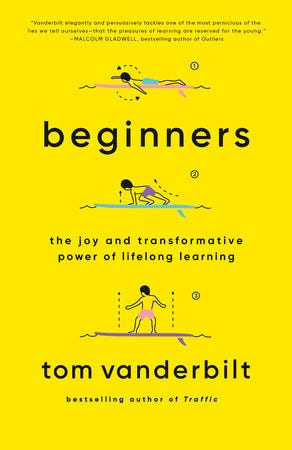Beginners: The Joy and Transformative Power of Lifelong Learning, by Tom Vanderbilt (320 pages)
Rating: 5/5
Who should read it: Anyone, particularly if you are interested in the science of learning / training or want ideas for new things to do
Summary
In Beginners, Tom Vanderbilt argues that adults need to spend more time learning new things. Once we grow up, we tend to stick to what we know best - our jobs, hobbies we picked up in childhood or college. But by not trying new things, we’re missing out on real benefits:
Learning new things is a workout for our brains and keeps us sharp as we get older
Our serious hobbies / passions often become too serious: if you’ve been a serious weightlifter for 15 years, you will have to work extremely hard and be highly disciplined to eke out even small gains. When we learn something new, it’s often easier to improve and feels lower-stakes and “lighter”
When we try something new, it feels novel, exciting, and tends to be more memorable. This has the benefits of 1) making your time seem fuller and richer (discussed in the excellent Off the Clock) and 2) being a cool feeling (think about your first days in college and how big the school and its possibilities felt)
We might even have fun doing the activity itself!
The book follows Vanderbilt’s quest to learn more skills (chess, surfing, singing, juggling, drawing) with occasional deep-dives into the science behind learning and skill acquisition. I found both parts of the book interesting and engaging, largely due to his fun writing style.1 It isn’t particularly prescriptive, so if you are looking for "one cool trick to learn things faster,” this probably isn’t it.
Key takeaways and insights
As mentioned above, learning new things is really good for you
It’s ideal to learn new things with some kind of teacher or coach as they can provide real-time feedback on how you are performing
Intentional practice is important: If you want to improve your chess game…“you don’t do it by playing chess. You do it with solitary study of the grandmasters’ games.”
Learning a new skill is “U-shaped”: At first, your gains are pretty good given you’re just learning the basics. But once you have those down and become an “advanced beginner,” you start noticing all the things you still don’t know and aren’t doing correctly. This is the tough part!
AKA the Dunning-Krueger Effect, where people who are not competent at a skill are more likely to overestimate their ability relative to competent / experienced people
So if you’re learning something new and it suddenly feels like you don’t know anything, realize that this is normal
Thoughts and reactions
The topic resonated with me: one of my bigger regrets is that I didn’t try to learn a lot of new skills / hobbies growing up as I thought they weren’t cool or was afraid to fail2. Having done some adult learning, would agree that is it is fun and rewarding. The key challenge is getting over the “activation energy” to find and commit to something
One superpower that learning new things gives you is comfort with being bad at something and looking dumb. I’ve found this to carry over to other areas of life and generally reduce stress, and make me more comfortable taking risks. In fact, one of the coolest things about trying new things is that 1) you have the freedom to be terrible with 0 consequence and 2) the realization that nobody actually cares how bad you are about most things in life
A key implicit benefit of trying new things is community, friendship, and connection - in all of his activities, Vanderbilt talks just as much about the people he meets as he does the activity itself. This, like traveling, is probably an area where extroverts have more fun (or if you’re an introvert, it’s likely easier to connect with people through a shared activity as opposed to meeting in a bar)
Another key part of the book is learning by doing - “what makes skills so skillful is that we don’t really know how we do them. This is why written instructions are so often of little use in skill learning.” I’ve found this to generally be true in the professional world as well. And even with “self help books,” I generally find them to be lower-value unless you actively work at trying to implement their suggestions. Reading How to Win Friends and Influence People is easy. Being nice to people and attentive to their needs is hard!
He suggests that busy parents learn a skill with their kids as opposed to banging out work emails on the bleachers at your kid’s soccer practice, which seems like a cool idea
This book nicely complements Four Thousand Weeks and its discussion of the importance of having hobbies for their own sake as opposed to maximizing “usefulness.”
There’s an interesting discussion of how babies are the ultimate learners. Part of this is due to their environment - no negative feedback, relatively small consequences for mistakes, lots of parental encouragement
Babies also don’t learn from their mistakes, as it’s important for them to keep trying things and experiencing failure in multiple scenarios. “Infants live what might be called the beginner’s creed: If you don’t learn to fail, you’ll fail to learn.”
Related reading
One cool skill to learn if you have an afternoon or two is how to actually use a knife when cooking. Buy a bunch of vegetables and google “learn knife skills” and have at it. I did this a couple of years ago and found it’s 1) made cooking more fun and 2) has a high results to efforts ratio assuming you do some regular cooking
A lot of this falls into the “self-deprecating Dad humor” genre, which also describes my life fairly accurately.
I still persevered and managed to be uncool nonetheless.



Excellent summary, thank you Josh!